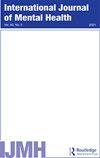加沙地带巴勒斯坦大学生自杀行为的风险和保护:军事暴力背景下的探索性研究
IF 1.4
Q3 PSYCHOLOGY, CLINICAL
引用次数: 11
摘要
摘要本研究的目的是比较加沙不同自杀风险群体大学生的心理特征。四百三十一名大学生(M年龄=20.53 年,SD = 1.89,范围=17-21),其中75人报告有自杀“高风险”,他们被招募到加沙地带,并被要求完成加沙围攻检查表、哥伦比亚自杀严重程度评定量表、贝克绝望量表、柏林社会支持量表和康纳·戴维森复原力量表。使用逐步判别分析(DA)对数据进行分析。精神痛苦、绝望和社会韧性(社会支持)对判别函数有贡献。较低的个人恢复力并不是自杀风险的重要判别因素。我们的研究结果引起了人们对在以持续低强度战争为特征的背景下自杀行为所涉及的心理、社会和政治因素之间的关系的关注。长期和系统的暴力破坏了对自杀意念的保护因素,可能会破坏社会韧性。最终,建议进行旨在检测和促进社交网络以降低自杀风险的研究和干预。本文章由计算机程序翻译,如有差异,请以英文原文为准。
Risk and protection of suicidal behavior among Palestinian University Students in the Gaza Strip: An exploratory study in a context of military violence
Abstract The aim of the present study was to compare the psychological characteristics of university students in Gaza groups at differing levels of risk of suicide. Four hundred and thirty-one university students (M age = 20.53 years, SD = 1.89, range = 17–21), 75 of whom reported being at “high risk” of suicide were recruited in the Gaza Strip and asked to complete the Gaza Siege Checklist, Columbia-Suicide Severity Rating Scale, Beck Hopelessness Scale, Berlin Social Support Scale, and Connor-Davidson Resilience Scale. The data were analyzed using stepwise discriminant analysis (DA). Mental distress, hopelessness, and social resilience (social support) contributed to the discriminant function. Lower personal resilience was not a significant discriminating factor for suicide risk. Our findings draw attention to the relations among the psychological, social, and political factors implicated in suicidal behavior in a context characterized by ongoing low-intensity warfare. Social resilience can be undermined by conditions of protracted and systematic violence undermining protective factors against suicidal ideations. Ultimately, research and intervention oriented at detecting and promoting social networks to reduce the risk of suicide are recommended.
求助全文
通过发布文献求助,成功后即可免费获取论文全文。
去求助
来源期刊

INTERNATIONAL JOURNAL OF MENTAL HEALTH
PSYCHOLOGY, CLINICAL-
CiteScore
3.80
自引率
20.00%
发文量
32
期刊介绍:
The official journal of the World Association for Psychosocial Rehabilitation, the International Journal of Mental Health features in-depth articles on research, clinical practice, and the organization and delivery of mental health services around the world. Covering both developed and developing countries, it provides vital information on important new ideas and trends in community mental health, social psychiatry, psychiatric epidemiology, prevention, treatment, and psychosocial rehabilitation.
 求助内容:
求助内容: 应助结果提醒方式:
应助结果提醒方式:


